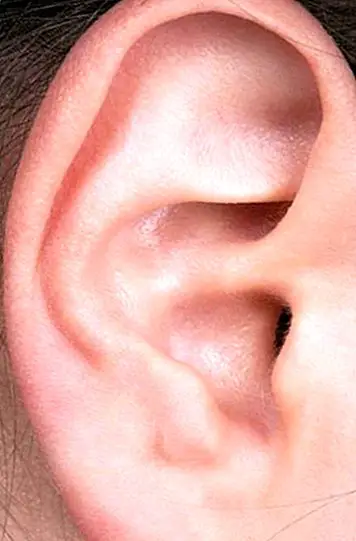Bexsero: all the answers about the meningitis vaccine B
If you have a small child it is quite likely that you have already heard about it. Or that you have even approached a nearby pharmacy in order to buy it. And, it is also possible that you have found the surprise that when you go to look for it, it is not available. Indeed, we are talking about Bexsero, the only vaccine available to date against Meningicoco B(or, what is the same, the bacteria that causes meningitis B).
However, despite the problems of shortages in recent months, even with waiting lists of dozens of people in many pharmacies, the day of writing this article you read (dated April 26, 2017), the developer of the vaccine has indicated that it has become available again.

In any case, it is treated as you surely know at this point, a vaccine that is not included in the schedule of vaccines of the Spanish public health system, contrary to what does-for example-with the vaccine against Meningitis C.
What is Bexsero? What is it for?
Even though Bexsero is purely its commercial name, we have a vaccine whose main function is to get the immunization against meningicoco b, a type of bacteria that as we know in a nearby section, can cause a generalized infection (sepsis) or infections of the meninges.
What is meningicoco?
The meningicoco is a microbe, specifically a bacterium, which causes infrequent but serious infections, as for example is the case of both meningitis and sepsis (infection of the blood).
This microbe usually lives during seasons in the throat and in the nose of adolescents and healthy young people, without practically producing any damage, being considered as asymptomatic carriers.

But nevertheless, the most frequent cases occur in young children and adolescents.
These infections can leave serious sequelae, or lead to death if it is not treated early.
What is meningitis B? Is it really that serious?
The type meningitis B, also known medically with the name of meningococcal meningitis, is a type of serious bacterial infection that affects the membranes that surround the brain and the spinal cord.
That is, it causes an inflammation -of rapid appearance- of the different layers that cover both the brain and the spinal cord (meninges), as well as the space that contains the fluid located between the meninges themselves.
It is treated as we see a medical emergency that should be treated with antibiotics as soon as possible, since they tend to be effective when they are administered early, which helps reduce inflammation of the brain.
In fact, Gravity occurs when sepsis occurs rapidly and extensively, not giving time to apply the appropriate antibiotic treatment.
As many experts say, actually Type B meningitis is quite rare. However, it is true that the alarm has spread in recent months at the rate of 48 cases that have occurred in Spain over the last year, according to data provided by the Carlos III Health Institute.
It is a bacterial infection which affects especially children under 5 years and people over 70 years of age, with a mortality rate of around 10%.

What is there to know about the Bexsero vaccine?
Who should be vaccinated of the meningicoco b
The Spanish Association of Pediatrics, through the Advisory Committee on Vaccines, indicates that The vaccine can be given at any age from 2 months of age.
What are your adverse reactions?
This is a topic that worries many parents. Although it is true that this vaccine may cause a slightly greater adverse reaction compared to other vaccines, the associated reactions are actually mild.
In fact, the most common are: pain and redness at the injection site, fever and irritability.
How is it administered
The vaccine is injected intramuscularly. In children up to 1 and 2 years it is preferable to administer it in the thigh, and in the shoulder after 2 years.
How many doses are necessary
The number of doses to be administered depends directly on the age at which vaccination begins:
- Infants from 2 to 5 months: 3 doses of primary immunization and 1 booster dose between 12 and 15 months.
- Unvaccinated infants from 6 to 11 months: 2 doses of primary immunization and 1 dose of reinforcement.
- Unvaccinated infants from 12 to 23 months: 2 doses of primary immunization and 1 dose of reinforcement.
- Children from 2 to 10 years old: 2 doses (no booster dose is required).
- Children from 11 years of age, adolescents and adults: 2 doses (no booster dose is required).

It is effective?
The general protection of the vaccine oscillates around 70%, while its effectiveness in protecting against three of the four variants of the meningicoco is more than 90%.
Is it advisable to give the Bexsero vaccine to the child?
On the one hand we find the opinion of the Ministry of Health, which considers that the Bexsero vaccine is actually recommended for a few specific cases: when there is asplenia (that is, lack of spleen or this does not work properly), in case of uncommon complications, when an outbreak occurs, or in people who handle the bacteria.
That is, they consider that being a vaccine of recent appearance could have unexpected adverse effects, and that until 2013 (time of appearance of the drug) meningitis b was not a health problem, nor indeed it is at present.
On the other hand, the Spanish Association of Pediatrics is one of the main proponents of this vaccine, because although it is indeed a rare infection, the vaccine has not had significant adverse effects, and would help to avoid the complications of meningitis b.

So, what do you do as a father and mother?
Probably you have found the surprise that a pediatrician advises you to vaccinate against meningitis B, and yet another specialist will give you the opposite opinion.
In this case, as we see, the decision to vaccinate or not the child is from each mother and father, given that we are facing a type of vaccination that is optional. As Armando Bastida writes in Babies and Mamás' formidable blog, "although it could be said statistically that it is almost impossible for our son to never have a B meningitis, it is not impossible, and the disease is serious". This article is published for informational purposes only. You can not and should not replace the consultation with a Pediatrician. We advise you to consult your trusted pediatrician.



